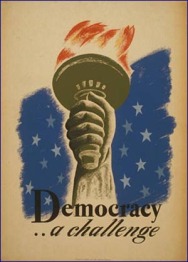
Jacquie recently wrote a wonderful post on campaign finance reform, illuminating the currently debated Citizens United versus Federal Elections Committee case.
Although it’s not a ‘sexy’ issue compared to, say, climate change, campaign finance law has implications that can fundamentally shape the structure and direction of our nation’s politics. OpenPolitics predicts that Citizens United, who is advocating for unlimited corporate campaign contributions, will win the case in a 5-4 vote, due to the majority of conservative judges.
On reading the court’s transcript proceedings, to be frank, I’m very troubled by some of the judge’s arguments on this incredibly complex issue, sometimes simply equating tradition as fact (but I suppose that’s what defines strict constructionists).
Those in favor of Citizens United appear to bring in two fundamental assumptions that are, with investigation, very tenuous.
- Corporations are citizens, therefore they deserve first amendment rights. Unlimited campaign contributions are an expression of first amendment rights (an argument supported by Ginsburg)
- Corporations have diverse interests and generally promote the common good (an argument supported by Roberts)
The first assumption, for example, is an issue that is fundamental to economic geography (the study of the spatial locations of economic activities) and political economy (the study of the interactions between economic and political institutions). Several points prove this assumption tenuous.
- Corporations wield disproportionate levels of economic power and information, especially around their internal affairs, compared to those of the everyday citizen.
- Corporations (and their capital) are hyper-mobile across borders, much more flexible, and are less tied to local communities, which afford it advantages over the average citizen-laborer.
- Corporations exhibit extremely psychopathic psychological behavior by human standards. Bakan, a law professor at York and the University of British Columbia illustrates this compellingly in his book The Corporation: The Pathological Pursuit of Profit and Power. His must-watch documentary, also titled “The Corporation”, is also free to stream here.
The second assumption is also called into question by Bakan’s writings, and also made clear by Obama’s solicitor general, Elena Kagan.
- Corporations serve the economic bottom line. In fact, bottom lines are written into corporate governance law and CEOs have been fired, and even sued, for not following them. JG Speth, an environmental sciences professor at Yale University, critically illustrates this point and other corporate governance issues in chapter 8 of his book Bridge to the End of the World (free copy of his book in this link).
- Corporations who strictly adhere to the bottom line often cause environmental and the socio-economic harm. The cases of Exxon’s toxic waste dump in Ecuador or Walmart’s shady labor practices and its negative impacts on small businesses come to mind. It is for these reasons Bakan comes to the conclusion modern corporations are indeed psychopathic, serving economic interests at the expense of other important quality of life standards. JG Speth, Bill McKibben, Logan and Moloch, and a slew of other environmental and social scholars make similar criticisms.

Washington Post's Coverage of Exxon Oil Spill
One final point must be made. The playing field for campaign contributions is intensely uneven. Political spending on a recent environmental regulation issue illustrates this point. Oil corporations alone spent nearly $80 million against the regulation. Corporations (and the elite citizens who control them) spend the majority on campaigns, and their actions can often shape policy and oversight, a premise two New York University political scientists have tested and supported in the case of nuclear energy regulations.

An Uneven Match-Up
When I often read about Supreme Court cases that affect our political and economic institutions, I’m quite frightened. Major decisions are made in enclaves by supposedly objective judges who wield impressive law degrees from Ivy League universities. To believe in this objectivity is quite false. The human mind is much more irrational and ideological than we would like to admit.
Interestingly, this issue of campaign finance, at first glance, may seem simply to do with, well, campaign finance. There are, however, larger issues of our economy and our politics at stake. The corporation is the major institution of our society today. We may do well to reform corporate governance toward a “corporation of the future” as Speth discusses in chapter 8 of his book. It is a corporation that is truly democratic. A corporation that, as its default setting, promotes innovation, socio-economic responsibility, and environmental sustainability. It is a corporation that, at its heart, will increase opportunities for all.

Corporation of the Future
If we are to remain a true democracy and a nation of opportunity, we must also closely observe reality. The playing field is uneven. To blindly assume all is fair and well, we will simply reinforce inequality and limit opportunity for all. It is not fair and well in campaign finance.



Hey Dan,
Thanks for expanding on my campaign finance post…and in pretty amazing detail I might add. I agree with your concerns for the future of politics if Citizens United does take the case. The interesting thing about this issue though is that it really doesn’t break down perfectly along party lines. Regulating campaign expenditures is not just in the best interest of the liberals who wish to keep the corporations out of the mix, but conservatives can also stand to benefit from keeping the FEC active in regulating the union presence in campaigns. It would be advantageous to both sides to agree that the FEC’s regulation of spending on behalf of both corporations and unions should not be written out of the campaign process.
Another major impact that this decision could have on elections would manifest itself in the form of how the candidates choose to win elections. If the only way to win is to spend all their time and effort catering to the big players to win them over, then they severely limit the amount of time they are able to spend with their constituents along the campaign trail…which in turn leads to voters feeling sidelined from the political process while the big spenders duke it out on the main stage.
I completely agree. Any look at the major bills this year (healthcare, transportation, etc) always brings up interest groups funded by wealthy corporations and coalitions with rosters of 50 or more professional lobbyists. (take a look at the money spent on a coming transportation bill by major lobbyists: http://www.planetizen.com/node/40735)
An abnormality appears to be Transportation For America, which is one of the few that seem to lobby for low and middle income individuals, and progressive policies such as public transportation.
In either case, I agree that it doesn’t break down by party lines (ex. McCain and, in this article, Slade Gorton).
All of this really does cast a shadow over the pluralist’s vision of democracy in America- that, because inequalities are spread out evenly, everyone really has an equal chance to affect politics.
Instead, it is far from the pluralist’s utopia. The landscape of influence is starkly uneven. Many are probably claiming to represent “us” and our views, to benefit the common good and gain public investment. Many of us end up getting hurt in the process. This type of ‘democracy’ is quite troublesome.